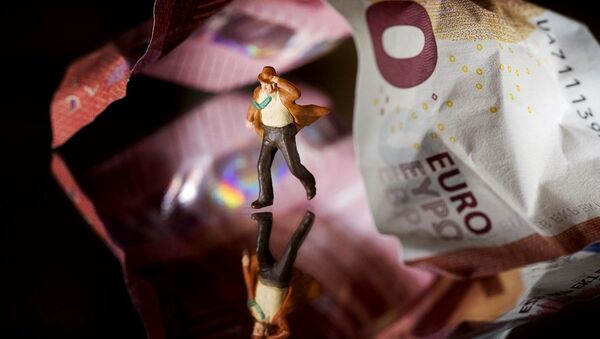If Greece fails to meet demands set by the Troika on Sunday, Greece will be left with no choice other than to leave the Eurozone. The Greek people have been left with only hope. In four days’ time, Greece could become the first country to exit the Eurozone.
"They’ve been through the equivalent of a great depression. People have problems affording electricity. Greece is very much on the verge of becoming a humanitarian crisis," economics expert and Washington Post reporter Matt O’Brien told Sputnik.
"This is the most catastrophic economic performance in peace time since World War II. This time, it seems like the EU has pushed Greece farther than they’re capable of going, they’re demanding that Greece accepts terms that are even harsher than the ones on offer before the referendum."
"It’s hard to see how the Greek government can go to the people who rejected those terms initially and present worse terms a week later. If that’s the case, we’re looking at Greece leaving the Eurozone on Monday."
For the last 60 years, the European Union has been moving closer together — but if Greece leaves the Eurozone – the domino effect on other member states could be dramatic.
Finland’s economy isn’t growing and Italy, which has a smaller economy than when it joined the euro 15 years ago, still isn’t showing any signs of growth, despite meeting all of Germany’s demands.
"After #Grexit, we need Finnish €-exit"-Veteran politician of Finland's governing Centre Party Paavo Väyrynen http://t.co/3w6dU97Q3Z #FIXIT
— Pieter Cleppe (@pietercleppe) June 22, 2015Neither #brexit nor #grexit would send the right political signal. Only Finland's departure would! I mean, come on.. #fixit.. simple n easy
— Mickey Mouse Bar (@Europarl_MMBar) March 23, 2015
According to Paavo Matti Vayrynen, member of Finland’s Centre Party, if Greece leaves the Eurozone, "Finland should do the same."
"The transition to the single currency was a bad mistake."
In a statement on his official website, Vayrynen suggests that a Greek exit from the Eurozone would be an opportunity for Finland to 'Fixit' and potentially leave the EU common currency.
#EPlenary #Greece debate earlier w/ @tsipras_eu @JunckerEU @eucopresident. Recap on @Storify → http://t.co/RyALGGMBYg pic.twitter.com/bnBawkuQfg
— European Parliament (@Europarl_EN) July 8, 2015
So was Greece a Eurozone experiment for austerity? According to Alexander Douglas, lecturer in the philosophy of economics at University of London, "the Eurozone itself is an experiment with austerity."
"The set-up of the single currency makes it impossible for countries to run sustained deficits without driving up bond yields, and the Stability and Growth Pact forbids nations to run sizeable deficits at all. The prevailing idea must have been that no government would ever need to run a deficit."
Douglas explains that in order to hold up aggregate demand during a depression, governments need to run large deficits.
"Otherwise you see unemployment billowing out of control. If any experimental evidence of this was needed, the case of Greece provides it.
"It is a simple matter of accounting. For every credit there is a debit, so if some people are earning more than they spend (which happens during a depression when people either save or pay down private debt), then others must be spending more than they earn.
"Unless the latter are provided with an infinite credit line, they will be in need of more money than they are able to earn, which is a pretty good definition of unemployment."
Deal or No Deal, Future Is Doomed
Economics expert Matt O’Brien told Sputnik that deal or no deal, Greece’s future is doomed.
"It’s hard to see where the hope is, if Greece stays in the Eurozone, it means more austerity and they may not get unemployment under 25 percent for four or five years. And if Greece leaves the Eurozone, the first couple of years are going to be complete hell for the Greek people."
"Unemployment will be worse than the 25 percent it already is, inflation will go into double digits, companies are probably going to default and they may have to ration food and oil."
The euro is a paper monument to peace and prosperity that's made the latter impossible http://t.co/oJxxXx7MQw pic.twitter.com/PZDy7ErwN5
— Matt O'Brien (@ObsoleteDogma) July 8, 2015
But O’Brien admits there is a glimmer of hope left for the Greek people: "If they can make it through the next year, they’ll be left with a cheaper currency making their exports more competitive and in two or three years’ time they may be in a better shape than if they hadn’t left the Eurozone."



